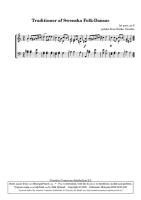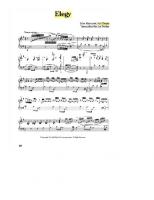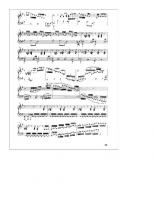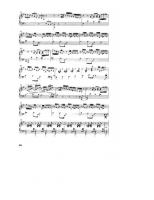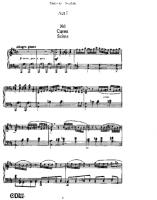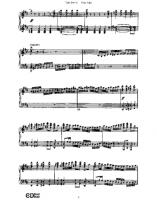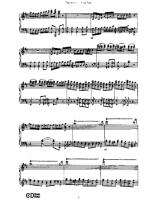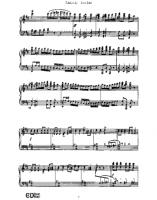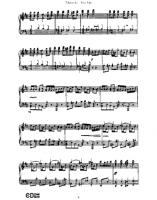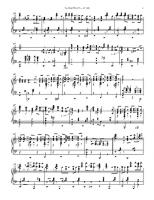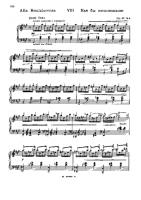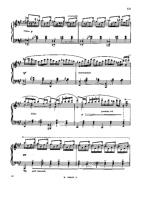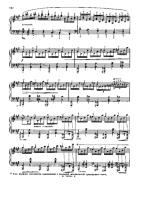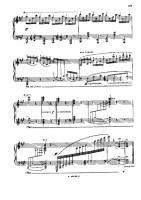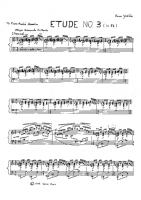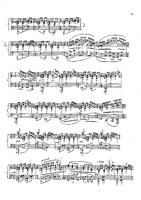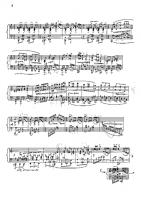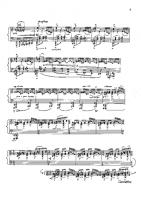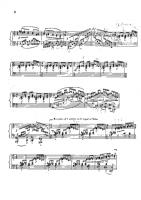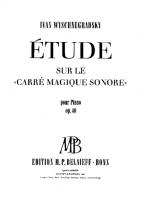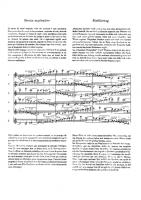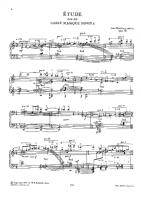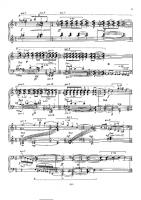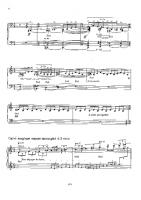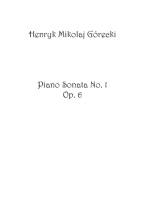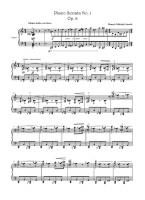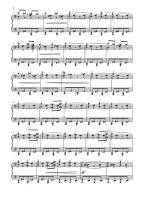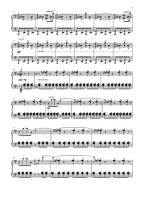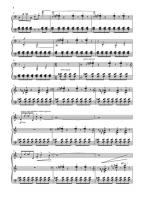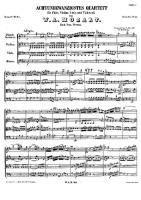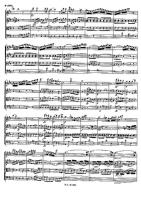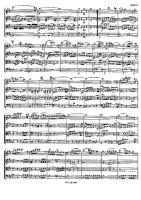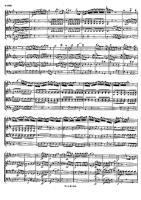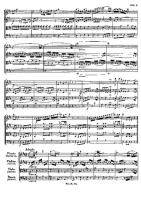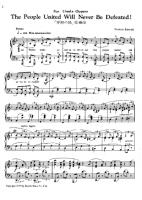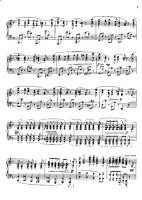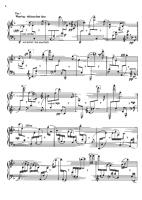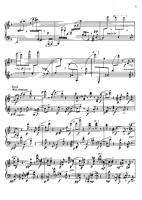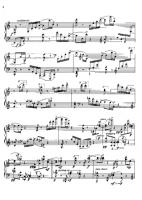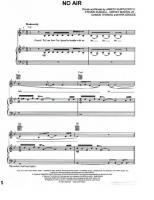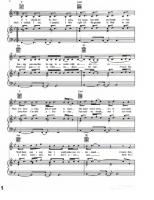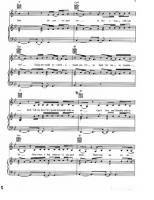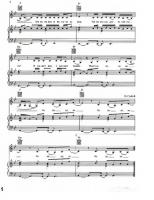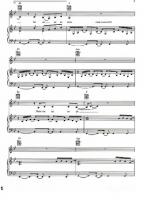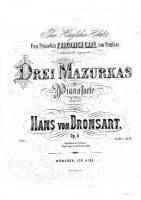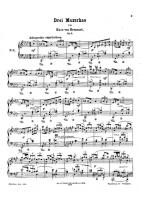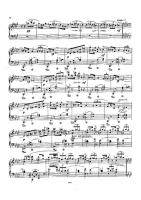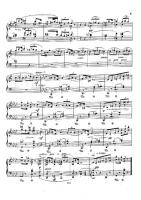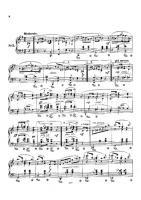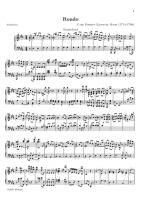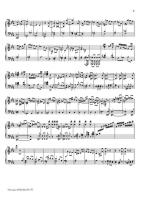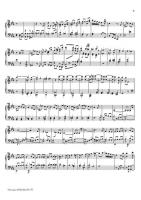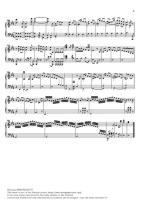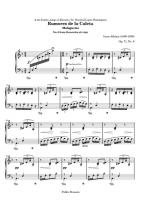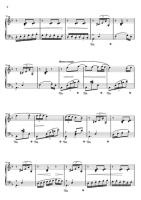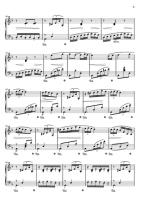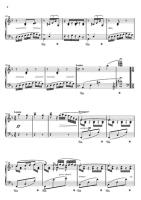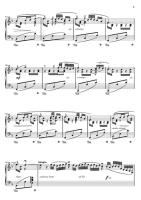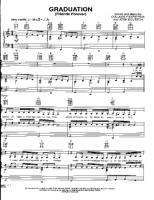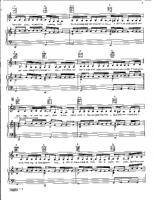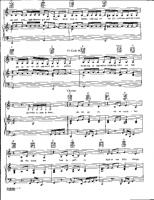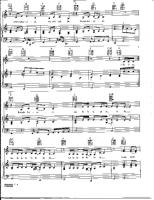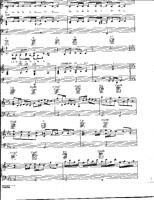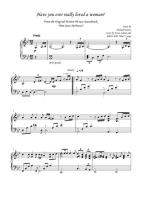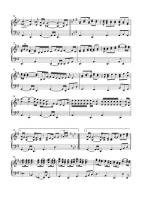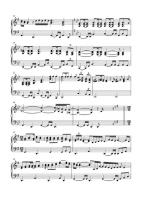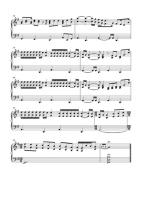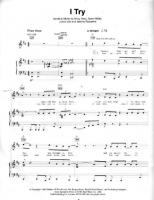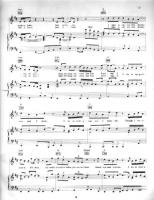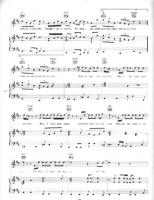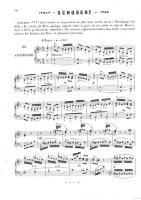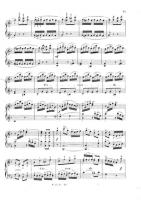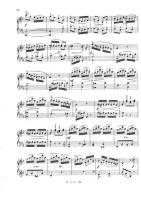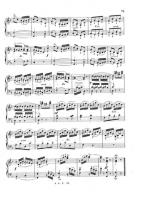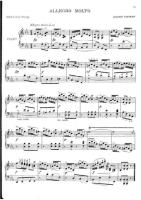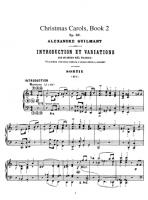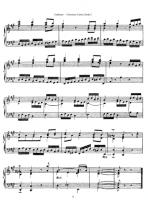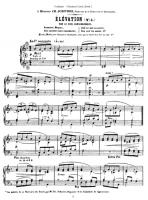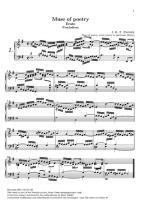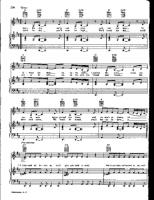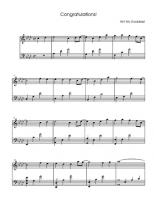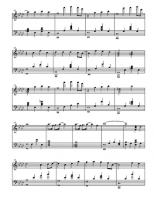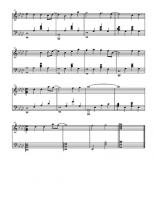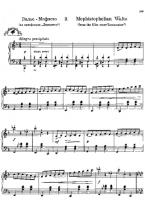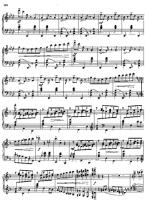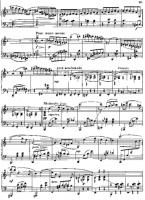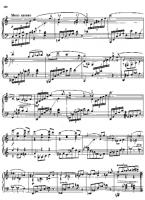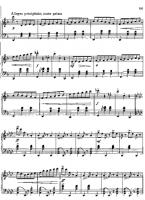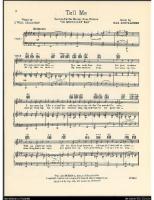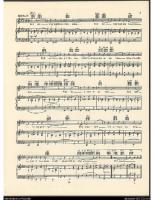Latest Sheets
Traditional
 traditional music
traditional music
Bruce Springsteen
 Bruce Frederick Joseph Springsteen (born September 23, 1949) is an influential American songwriter, singer and guitarist. He has recorded and toured with the E Street Band. Springsteen is widely known for his brand of heartland rock infused with pop hooks, poetic lyrics, and Americana sentiments centered around his native New Jersey. His eloquence in expressing ordinary, everyday problems has earned him numerous awards, including eighteen Grammy Awards and an Academy Award, along with a notoriously dedicated and devoted global fan base. His most famous albums, Born to Run and Born in the U.S.A., epitomize his penchant for finding grandeur in the struggles of daily life. He has sold over 65 million albums in the U.S.
Bruce Frederick Joseph Springsteen (born September 23, 1949) is an influential American songwriter, singer and guitarist. He has recorded and toured with the E Street Band. Springsteen is widely known for his brand of heartland rock infused with pop hooks, poetic lyrics, and Americana sentiments centered around his native New Jersey. His eloquence in expressing ordinary, everyday problems has earned him numerous awards, including eighteen Grammy Awards and an Academy Award, along with a notoriously dedicated and devoted global fan base. His most famous albums, Born to Run and Born in the U.S.A., epitomize his penchant for finding grandeur in the struggles of daily life. He has sold over 65 million albums in the U.S.Springsteen's lyrics often concern men and women struggling to make ends meet. He has gradually become identified with progressive politics. Springsteen is also noted for his support of various relief and rebuilding efforts in New Jersey and elsewhere, and for his response to the September 11, 2001 attacks, on which his album The Rising reflects.
Springsteen's recordings have tended to alternate between commercially accessible rock albums and somber folk-oriented works. Much of his iconic status stems from the concerts and marathon shows in which he and the E Street Band present intense ballads, rousing anthems, and party rock and roll songs, amongst which Springsteen intersperses long, whimsical or deeply emotional stories.
Springsteen has long had the nickname "The Boss", a term which he was initially reported to hate but now seems to have come to terms with, as he sometimes jokingly refers to himself as such on stage. The nickname originated when a young Springsteen, playing club gigs with a band in the 1960s, took on the task of collecting the band's nightly pay and distributing it amongst his bandmates.
Carrie Underwood
 Carrie Marie Underwood (born March 10, 1983 in Muskogee, Oklahoma) is an American country singer-songwriter. She rose to fame as the winner of the fourth season of American Idol, and has become a multi-platinum selling recording artist and a multiple Grammy Award winner. Her debut album, Some Hearts, was certified seven times platinum and is the fastest selling debut country album in Nielsen SoundScan history.
Carrie Marie Underwood (born March 10, 1983 in Muskogee, Oklahoma) is an American country singer-songwriter. She rose to fame as the winner of the fourth season of American Idol, and has become a multi-platinum selling recording artist and a multiple Grammy Award winner. Her debut album, Some Hearts, was certified seven times platinum and is the fastest selling debut country album in Nielsen SoundScan history.Her second album, Carnival Ride, was released on October 23, 2007. It has so far sold about 2 million copies To date, Underwood has sold over 11 million records in the United States. Underwood was inducted as a member of the Grand Ole Opry on May 10, 2008.
Yiruma
 Yiruma (born February 15 1978, Seoul, Korea) is a South Korean piano music composer. He is married to Son Hye-im.
Yiruma (born February 15 1978, Seoul, Korea) is a South Korean piano music composer. He is married to Son Hye-im.Yiruma is well-known throughout the world, and his albums are sold all over Asia, as well as the United States and Europe. His most famous pieces are "Kiss the Rain", and also "River Flows in You". These pieces are widely mistaken for being associated with the movie Twilight. Although he formerly held dual citizenship as a citizen of the United Kingdom and South Korea, in July 2006 he gave up his British citizenship and entered the Republic of Korea Navy to begin his military service, which is compulsory for all male South Koreans. He has lived in Osaka, Japan for 5 years to promote album sales before giving up his dual citizenship.
Tatum
Tchaikovsky
 Pyotr Il'yich Tchaikovsky (May 7 1840 â November 6 1893) was a Russian composer of the Romantic era. While not part of the nationalistic music group known as "The Five", Tchaikovsky wrote music which, in the opinion of Harold Schonberg, was distinctly Russian: plangent, introspective, with modally-inflected melody and harmony.
Pyotr Il'yich Tchaikovsky (May 7 1840 â November 6 1893) was a Russian composer of the Romantic era. While not part of the nationalistic music group known as "The Five", Tchaikovsky wrote music which, in the opinion of Harold Schonberg, was distinctly Russian: plangent, introspective, with modally-inflected melody and harmony.Aesthetically, Tchaikovsky remained open to all aspects of Saint Petersburg musical life. He was impressed by Serov and Balakirev as well as the classical values upheld by the conservatory. Both the progressive and conservative camps in Russian music at the time attempted to win him over. Tchaikovsky charted his compositional course between these two factions, retaining his individuality as a composer as well as his Russian identity. In this he was influenced by the ideals of his teacher Nikolai Rubinstein and Nikolai's brother Anton.
Tchaikovsky's musical cosmopolitanism led him to be favored by many Russian music-lovers over the "Russian" harmonies and styles of Mussorgsky, Borodin and Rimsky-Korsakov.
Nonetheless he frequently adapted Russian traditional melodies and dance forms in his music, which enhanced his success in his home country. The success in St. Petersburg at the premiere of his Third Orchestral Suite may have been due in large part to his concluding the work with a polonaise. He also used a polonaise for the final movement of his Third Symphony.
Berlin
Medtner
Yedidia
Ysaye
Anonymous
 Easy piano sheets to teach kids how to play piano.
Easy piano sheets to teach kids how to play piano.
Phil Collins
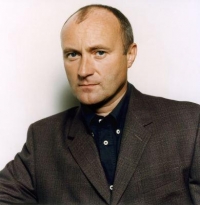 Philip David Charles Collins, LVO (born 30 January 1951 Chiswick, London) is an English singer-songwriter, drummer and actor best known as the lead singer and drummer of English progressive rock group Genesis and as a Grammy and Academy Award-winning solo artist. He has also appeared in several films.
Philip David Charles Collins, LVO (born 30 January 1951 Chiswick, London) is an English singer-songwriter, drummer and actor best known as the lead singer and drummer of English progressive rock group Genesis and as a Grammy and Academy Award-winning solo artist. He has also appeared in several films.Collins sang the lead vocals on eight American chart-toppers between 1984 and 1989; seven as a solo artist and one with Genesis. His singles, often dealing with lost love, ranged from the drum-heavy "In the Air Tonight", to the dance pop of "Sussudio", to the political statements of his most successful song, "Another Day In Paradise". His international popularity transformed Genesis from a progressive rock group to a regular on the pop charts and an early MTV mainstay. Collins' professional career began as a drummer, first with obscure rock group Flaming Youth and then more famously with Genesis. In Genesis, Collins originally supplied backing vocals for front man Peter Gabriel, singing lead on only two songs: "For Absent Friends" from 1971's Nursery Cryme album and "More Fool Me" from Selling England by the Pound, which was released in 1973. On Gabriel's departure in 1975, Collins became the group's lead singer. As the decade closed, Genesis's first international hit, "Follow You, Follow Me", demonstrated a drastic change from the band's early years. His concurrent solo career, heavily influenced by his personal life, brought both him and Genesis commercial success. According to Atlantic Records, Collins' total worldwide sales as a solo artist, as of 2002, were 150 million.
Paganini
 Niccolò Paganini (27 October 1782 – 27 May 1840) was an Italian violinist, violist, guitarist, and composer. He was one of the most celebrated violin virtuosi of his time, and left his mark as one of the pillars of modern violin technique. His caprice in A minor, Op. 1 No. 24 is among his best known of compositions, and serves as inspiration for many prominent artists.
Niccolò Paganini (27 October 1782 – 27 May 1840) was an Italian violinist, violist, guitarist, and composer. He was one of the most celebrated violin virtuosi of his time, and left his mark as one of the pillars of modern violin technique. His caprice in A minor, Op. 1 No. 24 is among his best known of compositions, and serves as inspiration for many prominent artists.Paganini composed his own works to play exclusively in his concerts, all of which had profound influences on the evolution of violin techniques. His 24 Caprices were probably composed in the period between 1805 to 1809, while he was in the service of the Baciocchi court. Also during this period, he composed the majority of the solo pieces, duo-sonatas,trios and quartets for the guitar. These chamber works may have been inspired by the publication, in Lucca, of the guitar quintets of Boccherini. Many of his variations (and he has become the de facto master of this musical genre), including Le Streghe, The Carnival of Venice, and Nel cor più non mi sento, were composed, or at least first performed, before his European concert tour.
Playbill of Paganini's concert at the Covent Garden in 1832. Note that all solo pieces were of his composition, which was typical of all his concerts.
Generally speaking, Paganini's compositions were technically imaginative, and the timbre of the instrument was greatly expanded as a result of these works. Sounds of different musical instruments and animals were often imitated. One such composition was titled Il Fandango Spanolo (The Spanish Dance), which featured a series of humorous imitations of farm animals. Even more outrageous was a solo piece Duetto Amoroso, in which the sighs and groans of lovers were intimately depicted on the violin. Fortunately there survives a manuscript of the Duetto which has been recorded, while the existence of the Fandango is known only through concert posters.
However, his works were criticized for lacking characteristics of true polyphonism, as pointed out by Eugène Ysaÿe. Yehudi Menuhin, on the other hand, suggested that this might have been the result of his reliance on the guitar (in lieu of the piano) as an aid in composition. The orchestral parts for his concertos were often polite, unadventurous, and clearly supportive of the soloist. In this, his style is consistent with that of other Italian composers such as Paisiello, Rossini and Donizetti, who were influenced by the guitar-song milieu of Naples during this period.
Paganini was also the inspiration of many prominent composers. Both "La Campanella" and the A minor caprice (Nr. 24) have been an object of interest for a number of composers. Franz Liszt, Johannes Brahms, Sergei Rachmaninoff, Boris Blacher, Andrew Lloyd Webber, George Rochberg and Witold Lutosławski, among others, wrote well-known variations on these themes.
Wyschnegradsky
Pachelbel
 Johann Pachelbel (baptized September 1, 1653 – buried March 9, 1706) was a German Baroque composer, organist and teacher who brought the south German organ tradition to its peak. He composed a large body of sacred and secular music, and his contributions to the development of the chorale prelude and fugue have earned him a place among the most important composers of the middle Baroque era.
Johann Pachelbel (baptized September 1, 1653 – buried March 9, 1706) was a German Baroque composer, organist and teacher who brought the south German organ tradition to its peak. He composed a large body of sacred and secular music, and his contributions to the development of the chorale prelude and fugue have earned him a place among the most important composers of the middle Baroque era.Pachelbel's work enjoyed enormous popularity during his lifetime; he had many pupils and his music became a model for the composers of south and central Germany. Today, Pachelbel is best known for the Canon in D, the only canon he wrote. In addition to the canon, his most well-known works include the Chaconne in F minor, the Toccata in E minor for organ, and the Hexachordum Apollinis, a set of keyboard variations.
Pachelbel's music was influenced by southern German composers, such as Johann Jakob Froberger and Johann Kaspar Kerll, Italians such as Girolamo Frescobaldi and Alessandro Poglietti, French composers, and the composers of the Nuremberg tradition. Pachelbel preferred a lucid, uncomplicated contrapuntal style that emphasized melodic and harmonic clarity. His music is less virtuosic and less adventurous harmonically than that of Dieterich Buxtehude, although, like Buxtehude, Pachelbel experimented with different ensembles and instrumental combinations in his chamber music and, most importantly, his vocal music, much of which features exceptionally rich instrumentation. Pachelbel explored many variation forms and associated techniques, which manifest themselves in various diverse pieces, from sacred concertos to harpsichord suites.
Friedman
Gorecki
Gruber
J. S. Bach
Johann Sebastian Bach (21 March 1685, O.S.31 March 1685, N.S. – 28 July 1750, N.S.) was a German composer, organist, harpsichordist, violist, and violinist whose sacred and secular works for choir, orchestra, and solo instruments drew together the strands of the Baroque period and brought it to its ultimate maturity. Although he did not introduce new forms, he enriched the prevailing German style with a robust contrapuntal technique, an unrivalled control of harmonic and motivic organisation, and the adaptation of rhythms, forms and textures from abroad, particularly from Italy and France.
Revered for their intellectual depth, technical command and artistic beauty, Bach's works include the Brandenburg Concertos, the Goldberg Variations, the Partitas, The Well-Tempered Clavier, the Mass in B minor, the St Matthew Passion, the St John Passion, the Magnificat, A Musical Offering, The Art of Fugue, the English and French Suites, the Sonatas and Partitas for solo violin, the Cello Suites, more than 200 surviving cantatas, and a similar number of organ works, including the famous Toccata and Fugue in D minor and Passacaglia and Fugue in C minor, as well as the Great Eighteen Chorale Preludes and Organ Mass.
Bach's abilities as an organist were highly respected throughout Europe during his lifetime, although he was not widely recognised as a great composer until a revival of interest and performances of his music in the first half of the 19th century. He is now generally regarded as one of the main composers of the Baroque style, and as one of the greatest composers of all time.
Revered for their intellectual depth, technical command and artistic beauty, Bach's works include the Brandenburg Concertos, the Goldberg Variations, the Partitas, The Well-Tempered Clavier, the Mass in B minor, the St Matthew Passion, the St John Passion, the Magnificat, A Musical Offering, The Art of Fugue, the English and French Suites, the Sonatas and Partitas for solo violin, the Cello Suites, more than 200 surviving cantatas, and a similar number of organ works, including the famous Toccata and Fugue in D minor and Passacaglia and Fugue in C minor, as well as the Great Eighteen Chorale Preludes and Organ Mass.
Bach's abilities as an organist were highly respected throughout Europe during his lifetime, although he was not widely recognised as a great composer until a revival of interest and performances of his music in the first half of the 19th century. He is now generally regarded as one of the main composers of the Baroque style, and as one of the greatest composers of all time.
Evanescence
 Evanescence is an American rock band founded in Little Rock, Arkansas in 1995 by singer/pianist Amy Lee and guitarist Ben Moody.
Evanescence is an American rock band founded in Little Rock, Arkansas in 1995 by singer/pianist Amy Lee and guitarist Ben Moody.After recording two private EPs and a demo CD named Origin, with the help of Bigwig Enterprises in 2000, the band released their first full-length album, Fallen, on Wind-up Records in 2003. Fallen sold more than 15 million copies worldwide and helped the band win two Grammy Awards. A year later, Evanescence released their first live album, Anywhere but Home, which sold more than one million copies worldwide. In 2006, the band released their second studio album, The Open Door, which has sold more than four million copies.
The band has suffered several line-up changes, including co-founder Moody leaving in 2003, followed by guitarist John LeCompt and drummer Rocky Gray in 2007. Lee is now the only original member of Evanescence remaining in the band.
The Lion King
 The Lion King is a 1994 American animated feature film produced by Walt Disney Feature Animation, released in theaters on June 15, 1994 by Walt Disney Pictures. It is the 32nd film in the Disney animated feature canon. The film was the highest grossing animated film of all time until the release of Finding Nemo (a Disney/Pixar computer-animated film). The Lion King still holds the record as the highest grossing traditionally animated film in history. This film also belongs to an era known as the Disney Renaissance.
The Lion King is a 1994 American animated feature film produced by Walt Disney Feature Animation, released in theaters on June 15, 1994 by Walt Disney Pictures. It is the 32nd film in the Disney animated feature canon. The film was the highest grossing animated film of all time until the release of Finding Nemo (a Disney/Pixar computer-animated film). The Lion King still holds the record as the highest grossing traditionally animated film in history. This film also belongs to an era known as the Disney Renaissance.The story, which was strongly influenced by the Shakespearean play Hamlet and Disney's 1942 classic Bambi, takes place in a kingdom of anthropomorphic animals in Africa. A musical film, The Lion King garnered two Academy Awards for its achievement in music. Songs were written by composer Elton John and lyricist Tim Rice, with an original score by Hans Zimmer. Disney later produced two related movies: a sequel, The Lion King II: Simba's Pride; and a part prequel-part parallel, The Lion King 1½.
The Lion King: Original Motion Picture Soundtrack is the original motion picture soundtrack for Walt Disney's The Lion King. The songs were written by Elton John and Tim Rice. The original score was composed and arranged by Hans Zimmer. The soundtrack was recorded in three different countries, namely: USA, UK and South Africa.
MacDowell
Dukas
 Paul Abraham Dukas (1 October 1865 – 17 May 1935) was a French composer, critic, scholar and teacher. A studious man, of retiring personality, he was intensely self-critical, and he abandoned and destroyed many of his compositions. His best known work is the orchestral piece The Sorcerer's Apprentice (L'apprenti sorcier), the fame of which has eclipsed that of his other surviving works. Among these are an opera Ariane et Barbe-bleue, a symphony, two substantial works for solo piano, and a ballet, La Péri.
Paul Abraham Dukas (1 October 1865 – 17 May 1935) was a French composer, critic, scholar and teacher. A studious man, of retiring personality, he was intensely self-critical, and he abandoned and destroyed many of his compositions. His best known work is the orchestral piece The Sorcerer's Apprentice (L'apprenti sorcier), the fame of which has eclipsed that of his other surviving works. Among these are an opera Ariane et Barbe-bleue, a symphony, two substantial works for solo piano, and a ballet, La Péri.At a time when French musicians were divided into conservative and progressive factions, Dukas adhered to neither but retained the admiration of both. His compositions were influenced by composers including Beethoven, Berlioz, Franck, d'Indy and Debussy.
In tandem with his composing career, Dukas worked as a music critic, contributing regular reviews to at least five French journals. Later in his life he was appointed professor of composition at the Conservatoire de Paris and the École Normale de Musique; his pupils included Maurice Duruflé, Olivier Messiaen, Manuel Ponce, and Joaquín Rodrigo.
Mahler
Albert
Mozart
 Wolfgang Amadeus Mozart, full name Johann Chrysostom Wolfgang Amadeus Mozart (27 January 1756 â 5 December 1791) was a prolific and influential composer of the Classical era. His over 600 compositions include works widely acknowledged as pinnacles of symphonic, concertante, chamber, piano, operatic, and choral music. Mozart is among the most enduringly popular of classical composers, and many of his works are part of the standard concert repertoire.
Wolfgang Amadeus Mozart, full name Johann Chrysostom Wolfgang Amadeus Mozart (27 January 1756 â 5 December 1791) was a prolific and influential composer of the Classical era. His over 600 compositions include works widely acknowledged as pinnacles of symphonic, concertante, chamber, piano, operatic, and choral music. Mozart is among the most enduringly popular of classical composers, and many of his works are part of the standard concert repertoire.Mozart's music, like Haydn's, stands as an archetypal example of the Classical style. His works spanned the period during which that style transformed from one exemplified by the style galant to one that began to incorporate some of the contrapuntal complexities of the late Baroque, complexities against which the galant style had been a reaction. Mozart's own stylistic development closely paralleled the development of the classical style as a whole. In addition, he was a versatile composer and wrote in almost every major genre, including symphony, opera, the solo concerto, chamber music including string quartet and string quintet, and the piano sonata. While none of these genres were new, the piano concerto was almost single-handedly developed and popularized by Mozart. He also wrote a great deal of religious music, including masses; and he composed many dances, divertimenti, serenades, and other forms of light entertainment.
The central traits of the classical style can be identified in Mozart's music. Clarity, balance, and transparency are hallmarks of his work.
S. C. Foster
J. L. Dussek
Frederic Rzewski
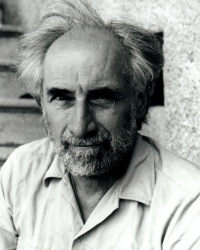 Frederic Anthony Rzewski (born April 13, 1938 in Westfield, Massachusetts) is an American composer and virtuoso pianist.
Frederic Anthony Rzewski (born April 13, 1938 in Westfield, Massachusetts) is an American composer and virtuoso pianist.Rzewski (pronounced zheff-skee) began playing piano at age 5. He attended Phillips Academy, Harvard and Princeton, where his teachers included Randall Thompson, Roger Sessions, Walter Piston and Milton Babbitt. In 1960, he went to Italy, a trip which was formative in his future musical development. In addition to studying with Luigi Dallapiccola, he began a career as a performer of new piano music, often with an improvisatory element. A few years later he was a co-founder of Musica Elettronica Viva with Alvin Curran and Richard Teitelbaum. Musica Elettronica Viva conceived music as a collective, collaborative process, with improvisation and live electronic instruments prominently featured. In 1971 he returned to New York.
In 1977 Rzewski became Professor of Composition at the Conservatoire Royal de Musique in Liège, Belgium, then directed by Henri Pousseur. Occasionally he teaches for short periods at schools and universities throughout the U.S. and Europe, including Yale University, the University of Cincinnati, the California Institute of the Arts, the University of California, San Diego, the Royal Conservatory of The Hague and Trinity College of Music, London.
Many of Rzewski's works are inspired by secular and socio-historical themes, show a deep political conscience and feature improvisational elements. Some of his better-known works include The People United Will Never Be Defeated! (36 variations on the Sergio Ortega song El pueblo unido jamás será vencido), a set of virtuosic piano variations written as a companion piece to Beethoven's Diabelli Variations; Coming Together, which is a setting of letters from Sam Melville, an inmate at Attica State Prison, at the time of the famous riots there (1971); North American Ballads; Night Crossing with Fisherman; Fougues; Fantasia and Sonata; The Price of Oil, and Le Silence des Espaces Infinis, both of which use graphical notation; Les Moutons de Panurge; and the Antigone-Legend, which features a principled opposition to the policies of the State, and which was premiered on the night that the United States bombed Libya in April 1986 (ibid). Between his most recent compositions, the most interesting are the two sets of Nanosonatas (2007) and the Cadenza con o senza Beethoven (2003), written for Beethoven's Fourth Piano Concerto.
Jordin Sparks & Chris Brown
 Jordin Brianna Sparks (born December 22, 1989) is an American pop/R&B singer, songwriter and plus-size model. On May 23, 2007, she was declared the winner of the sixth season of American Idol.
Jordin Brianna Sparks (born December 22, 1989) is an American pop/R&B singer, songwriter and plus-size model. On May 23, 2007, she was declared the winner of the sixth season of American Idol.
Beethoven
 Ludwig van Beethoven (16 December 1770 - 26 March 1827) was a German composer and pianist. He was a crucial figure in the transitional period between the Classical and Romantic eras in Western classical music, and remains one of the most respected and influential composers of all time.
Ludwig van Beethoven (16 December 1770 - 26 March 1827) was a German composer and pianist. He was a crucial figure in the transitional period between the Classical and Romantic eras in Western classical music, and remains one of the most respected and influential composers of all time.Born in Bonn, then in the Electorate of Cologne (now in modern-day Germany), he moved to Vienna in his early twenties and settled there, studying with Joseph Haydn and quickly gaining a reputation as a virtuoso pianist. Beethoven's hearing gradually deteriorated beginning in his twenties, yet he continued to compose masterpieces, and to conduct and perform, even after he was completely deaf.
Bronsart
Jongen
Alkan
C. P. E. Bach
I. M. F. Albéniz
Digimon
 Digimon (デジモン Dejimon?), short for "Digital Monsters" (デジタルモンスター Dejitaru Monsutā?), is a Japanese media franchise encompassing anime, manga, toys, video games, trading card games and other media. The franchise's eponymous creatures are monsters of various forms living in a "Digital World", a parallel universe that originated from Earth's various communication networks.
Digimon (デジモン Dejimon?), short for "Digital Monsters" (デジタルモンスター Dejitaru Monsutā?), is a Japanese media franchise encompassing anime, manga, toys, video games, trading card games and other media. The franchise's eponymous creatures are monsters of various forms living in a "Digital World", a parallel universe that originated from Earth's various communication networks.
i juk
Bruno Mars
 Peter Gene Hernandez (born October 8, 1985), better known by his stage name Bruno Mars, is an American singer-songwriter and music producer. Raised in Honolulu, Hawaii by a family of musicians, Mars began making music at a young age. After performing in various musical venues in his hometown throughout his childhood, he decided to pursue a musical career. Mars began producing songs for other artists, joining production team The Smeezingtons.
Peter Gene Hernandez (born October 8, 1985), better known by his stage name Bruno Mars, is an American singer-songwriter and music producer. Raised in Honolulu, Hawaii by a family of musicians, Mars began making music at a young age. After performing in various musical venues in his hometown throughout his childhood, he decided to pursue a musical career. Mars began producing songs for other artists, joining production team The Smeezingtons.He became recognized as a solo artist after lending his vocals and co-writing the hooks for the songs "Nothin' on You" by B.o.B, and "Billionaire" by Travie McCoy. He also co-wrote the hits "Right Round" by Flo Rida featuring Kesha, "Wavin' Flag" by K'naan, and "Fuck You!" by Cee Lo Green. In October 2010, he released his debut album, Doo-Wops & Hooligans. Anchored by the singles "Just the Way You Are" and "Grenade", the album peaked at number three on the Billboard 200. He has been nominated for seven Grammys at the 53rd Grammy Awards, which will be held on February 13, 2011.
Clay Aiken
 Clay Aiken (born Clayton Holmes Grissom on November 30, 1978) is an American pop singer who began his rise to fame on the second season of the television program American Idol in 2003. Based on album sales surpassed only by Idol winners Kelly Clarkson and Carrie Underwood, Aiken has become the most successful male and the most successful runner-up in that show's history.
Clay Aiken (born Clayton Holmes Grissom on November 30, 1978) is an American pop singer who began his rise to fame on the second season of the television program American Idol in 2003. Based on album sales surpassed only by Idol winners Kelly Clarkson and Carrie Underwood, Aiken has become the most successful male and the most successful runner-up in that show's history.In the years following his American Idol appearance Aiken has launched eight tours, authored a New York Times best-selling book Learning to Sing: Hearing the Music in Your Life with Allison Glock, and was the executive producer for a 2004 televised Christmas special, A Clay Aiken Christmas. He has been a frequent talk show guest, particularly on The Tonight Show and Jimmy Kimmel Live, appeared as a guest star on Scrubs, participated in comedy skits on Kimmel and Saturday Night Live, and made his Broadway debut playing the role of Sir Robin in Monty Python's Spamalot in January 2008.
Aiken created the Bubel/Aiken Foundation in 2003, accepted a UNICEF ambassadorship in 2004,
Aiken released a new studio album (the first album of original material since 2003's Measure of A Man), titled On My Way Here on May 6th, 2008. This is his 4th full length studio album, including a Christmas CD, and a CD of covers. He has also released one EP. On August 8, 2008, he became a father.
Vitamin C
 Colleen Ann Fitzpatrick (born July 20, 1969, although other sources list July 20, 1970) is an American pop music singer, dancer and actress, better known by her stage name, Vitamin C. Her singles include "Smile," "As Long As You're Loving Me," "Graduation (Friends Forever)", and "The Itch." She was ranked #76 on the Maxim Hot 100 Women of 2001. Mattel released a Vitamin C Doll in 2000. She has her own lipstick color developed after her signature red-orange and blonde hair.
Colleen Ann Fitzpatrick (born July 20, 1969, although other sources list July 20, 1970) is an American pop music singer, dancer and actress, better known by her stage name, Vitamin C. Her singles include "Smile," "As Long As You're Loving Me," "Graduation (Friends Forever)", and "The Itch." She was ranked #76 on the Maxim Hot 100 Women of 2001. Mattel released a Vitamin C Doll in 2000. She has her own lipstick color developed after her signature red-orange and blonde hair.
Don Juan DeMarco
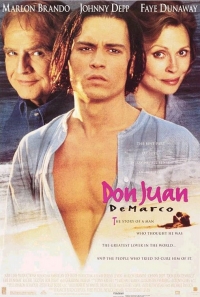 Don Juan DeMarco is a 1995 film starring Johnny Depp as John R. DeMarco, a man who believes himself to be Don Juan, the greatest lover in the world. Clad in a cape and domino mask, DeMarco undergoes psychiatric treatment with Marlon Brando's character, Dr. Jack Mickler, to cure him of his apparent delusion. But the psychiatric sessions have an unexpected effect on the psychiatric staff, some of whom find themselves inspired by DeMarco's delusion; the most profoundly affected is Dr. Mickler himself, who rekindles the romance in his complacent marriage.
Don Juan DeMarco is a 1995 film starring Johnny Depp as John R. DeMarco, a man who believes himself to be Don Juan, the greatest lover in the world. Clad in a cape and domino mask, DeMarco undergoes psychiatric treatment with Marlon Brando's character, Dr. Jack Mickler, to cure him of his apparent delusion. But the psychiatric sessions have an unexpected effect on the psychiatric staff, some of whom find themselves inspired by DeMarco's delusion; the most profoundly affected is Dr. Mickler himself, who rekindles the romance in his complacent marriage.The movie is based on two different sources; the modern-day story is based on director/screenwriter Jeremy Leven's short story Don Juan DeMarco and the Centerfold (the movie's original title before the studio changed it shortly before release), while the flashbacks depicting DeMarco's back-story are based on the more familiar legend of Don Juan, especially as told by Lord Byron in his version of the legend.
The film and soundtrack feature the original Bryan Adams song "Have You Ever Really Loved a Woman?"; the lyrics incorporate quotes from Depp's character, and the melody is used as a musical motif throughout the film. In addition, the song itself is performed three times, once by a mariachi band serenading the characters (in Spanish), once by Jose Hernandez and Nydia, as background music (again in Spanish), and once by Bryan Adams during the closing credits.
Macy Gray
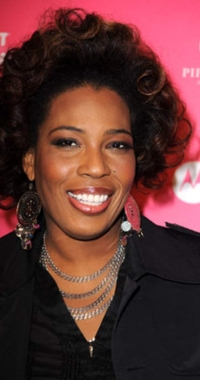 Macy Gray (born Natalie Renée McIntyre on September 6, 1967) is an American R&B and soul singer-songwriter, musician, record producer and actress. She is known for her distinctive raspy voice and a singing style heavily influenced by Billie Holiday.Gray has released ten studio albums, and received five Grammy Award nominations, winning one. She has appeared in a number of films, including Training Day, Spider-Man, Scary Movie 3, Lackawanna Blues, Idlewild, For Colored Girls, and The Paperboy. Gray is best known for her international hit single "I Try", taken from her multi-platinum debut album On How Life Is.
Macy Gray (born Natalie Renée McIntyre on September 6, 1967) is an American R&B and soul singer-songwriter, musician, record producer and actress. She is known for her distinctive raspy voice and a singing style heavily influenced by Billie Holiday.Gray has released ten studio albums, and received five Grammy Award nominations, winning one. She has appeared in a number of films, including Training Day, Spider-Man, Scary Movie 3, Lackawanna Blues, Idlewild, For Colored Girls, and The Paperboy. Gray is best known for her international hit single "I Try", taken from her multi-platinum debut album On How Life Is.
The Pogues
 The Pogues were an English or Anglo-Irish Celtic punk band fronted by Shane MacGowan and others, founded in Kings Cross, London in 1982, as "Pogue Mahone" – the anglicisation of the Irish Gaelic póg mo thóin, meaning "kiss my arse". The band reached international prominence in the 1980s and early 1990s, recording several hit albums and singles. MacGowan left the band in 1991 owing to drinking problems, but the band continued – first with Joe Strummer and then with Spider Stacy on vocals – before breaking up in 1996. The Pogues re-formed in late 2001, and played regularly across the UK and Ireland and on the US East Coast, until dissolving again in 2014. The group did not record any new material during this second incarnation.
The Pogues were an English or Anglo-Irish Celtic punk band fronted by Shane MacGowan and others, founded in Kings Cross, London in 1982, as "Pogue Mahone" – the anglicisation of the Irish Gaelic póg mo thóin, meaning "kiss my arse". The band reached international prominence in the 1980s and early 1990s, recording several hit albums and singles. MacGowan left the band in 1991 owing to drinking problems, but the band continued – first with Joe Strummer and then with Spider Stacy on vocals – before breaking up in 1996. The Pogues re-formed in late 2001, and played regularly across the UK and Ireland and on the US East Coast, until dissolving again in 2014. The group did not record any new material during this second incarnation.
Schobert
Guilmant
J. K. F. Fischer
Enrique Granados
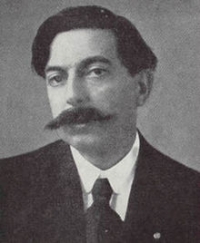 Enrique Granados y Campiña (27 July 1867 – 24 March 1916) was a Spanish Catalan pianist and composer of classical music. His music is in a uniquely Spanish style and, as such, representative of musical nationalism. Enrique Granados was also a talented painter in the style of Francisco Goya.
Enrique Granados y Campiña (27 July 1867 – 24 March 1916) was a Spanish Catalan pianist and composer of classical music. His music is in a uniquely Spanish style and, as such, representative of musical nationalism. Enrique Granados was also a talented painter in the style of Francisco Goya.Granados wrote piano music, chamber music (a piano quintet, a piano trio, music for violin and piano), songs, zarzuelas, and an orchestral tone poem based on Dante's Divine Comedy. Many of his piano compositions have been transcribed for the classical guitar: examples include Dedicatoria, Danza No. 5, Goyescas.
Granados was an important influence on at least two other important Spanish composers and musicians, Manuel de Falla and Pablo Casals. He was also the teacher of composer Rosa García Ascot.
Shakira
 Shakira Isabel Mebarak Ripoll (born February 2, 1977) known simply as Shakira, is a Colombian singer-songwriter of Lebanese and European descent, musician, record producer, dancer and philanthropist who has been a major figure in the pop music scene of Latin America since the mid-1990s. She is a native Spanish speaker and also speaks fluent English, Portuguese, Italian, and some Arabic. In 2001, she broke through onto the English-speaking world with the release of Laundry Service, which sold over thirteen million copies worldwide. Shakira is the highest-selling Colombian artist of all time, having sold more than 50 million albums worldwide, according to BMI. She has also won numerous awards worldwide, including two Grammy Awards, eight Latin Grammy Awards, fifteen Billboard Music Awards, three MTV Video Music Awards, a People's Choice Award and receiving a Golden Globe nomination. She is also the only artist from South America to reach the number-one spot on the Billboard Hot 100, the Australian ARIA chart, the United World Chart and the UK Singles Chart. Additionally, she is one of the only artists to have 10 Spanish singles chart on the Billboard Hot 100.
Shakira Isabel Mebarak Ripoll (born February 2, 1977) known simply as Shakira, is a Colombian singer-songwriter of Lebanese and European descent, musician, record producer, dancer and philanthropist who has been a major figure in the pop music scene of Latin America since the mid-1990s. She is a native Spanish speaker and also speaks fluent English, Portuguese, Italian, and some Arabic. In 2001, she broke through onto the English-speaking world with the release of Laundry Service, which sold over thirteen million copies worldwide. Shakira is the highest-selling Colombian artist of all time, having sold more than 50 million albums worldwide, according to BMI. She has also won numerous awards worldwide, including two Grammy Awards, eight Latin Grammy Awards, fifteen Billboard Music Awards, three MTV Video Music Awards, a People's Choice Award and receiving a Golden Globe nomination. She is also the only artist from South America to reach the number-one spot on the Billboard Hot 100, the Australian ARIA chart, the United World Chart and the UK Singles Chart. Additionally, she is one of the only artists to have 10 Spanish singles chart on the Billboard Hot 100.According to the United World Chart, Shakira is as of 2008 the 4th most successful artist so far for the last decade, in terms of single sales. She is also the only artist to have two songs in the top ten of the most successful singles since 1999. Los Angeles Times declared Shakira "the most completely adapted crossover performer in contemporary pop music".
Paramore
 Paramore is an American Pop rock band that formed in Franklin, Tennessee in 2004 consisting of Hayley Williams (lead vocals/keyboard), Josh Farro (lead guitar/backing vocals), Jeremy Davis (bass guitar), and Zac Farro (drums). The group released their debut album All We Know Is Falling in 2005, and their second album Riot! in 2007, which was certified platinum in the US and gold in the UK and Ireland.
Paramore is an American Pop rock band that formed in Franklin, Tennessee in 2004 consisting of Hayley Williams (lead vocals/keyboard), Josh Farro (lead guitar/backing vocals), Jeremy Davis (bass guitar), and Zac Farro (drums). The group released their debut album All We Know Is Falling in 2005, and their second album Riot! in 2007, which was certified platinum in the US and gold in the UK and Ireland.
3 Doors Down
 3 Doors Down is an American rock band formed in 1994 in Escatawpa, Mississippi by Brad Arnold (vocals and drums), Matt Roberts (guitar) and Todd Harrell (bass). The band signed to Universal Records after the success of their song "Kryptonite". The band has since sold well over 15 million albums worldwide since their debut album, The Better Life, which was released in 2000. They also perform more than 300 concerts a year and have shared the stage with other artists such as Tantric, Lynyrd Skynyrd, Staind, Nickelback, Alter Bridge, Breaking Benjamin, Econoline Crush, Hinder, Seether, Shinedown, Finger Eleven, and Daughtry. Hit song It's Not My Time is featured in the video game NHL 09.
3 Doors Down is an American rock band formed in 1994 in Escatawpa, Mississippi by Brad Arnold (vocals and drums), Matt Roberts (guitar) and Todd Harrell (bass). The band signed to Universal Records after the success of their song "Kryptonite". The band has since sold well over 15 million albums worldwide since their debut album, The Better Life, which was released in 2000. They also perform more than 300 concerts a year and have shared the stage with other artists such as Tantric, Lynyrd Skynyrd, Staind, Nickelback, Alter Bridge, Breaking Benjamin, Econoline Crush, Hinder, Seether, Shinedown, Finger Eleven, and Daughtry. Hit song It's Not My Time is featured in the video game NHL 09.
B*Witched
 B*Witched was an Irish girl group who enjoyed success in both Europe and North America between 1998 and 2000, releasing two albums and eight singles, all of which made the UK Top 20. The original lineup comprised twin sisters Edele and Keavy Lynch, Sinéad O'Carroll and Lindsay Armaou.
B*Witched was an Irish girl group who enjoyed success in both Europe and North America between 1998 and 2000, releasing two albums and eight singles, all of which made the UK Top 20. The original lineup comprised twin sisters Edele and Keavy Lynch, Sinéad O'Carroll and Lindsay Armaou.B*Witched's first four singles all topped the UK charts, making them the first Irish group to achieve that feat. The group split up in 2002 after being dropped by their record company. In 2006 the Lynch sisters formed a group, Ms. Lynch, which frequently performs B*Witched material at live shows and remains active as of 2008.
Boys Be...
Prokofiev
 Sergei Sergeyevich Prokofiev (Russian: Сергей Сергеевич Прокофьев; Ukrainian: Сергій Сергійович Прокоф'єв) (27 April 1891 – 5 March 1953) was a Russian composer, pianist and conductor who mastered numerous musical genres and came to be admired as one of the greatest composers of the 20th century.
Sergei Sergeyevich Prokofiev (Russian: Сергей Сергеевич Прокофьев; Ukrainian: Сергій Сергійович Прокоф'єв) (27 April 1891 – 5 March 1953) was a Russian composer, pianist and conductor who mastered numerous musical genres and came to be admired as one of the greatest composers of the 20th century.Prokofiev was a soloist with the London Symphony Orchestra, conducted by Piero Coppola, in the first recording of his Piano Concerto No. 3, recorded in London by His Master's Voice in June 1932. Prokofiev also recorded some of his solo piano music for HMV in Paris in February 1935; these recordings were issued on CD by Pearl and Naxos. In 1938, he conducted the Moscow Philharmonic Orchestra in a recording of the second suite from his Romeo and Juliet ballet; this performance was also later released on LP and CD. Another reported recording with Prokofiev and the Moscow Philharmonic was of the First Violin Concerto with David Oistrakh as soloist; Everest Records later released this recording on an LP.
Callahan
Chaminade
G. Verdi
Search for Free Sheet Music
You can make a search through the entire collection of sheets.
You can make a search through the entire collection of sheets.
Hi, fellow musicians!
There is no registration required to download the sheets but you can subscribe to our mailing list to get notified of new sheets.
There is no registration required to download the sheets but you can subscribe to our mailing list to get notified of new sheets.
Latest Artists
Coldplay
× 3
Dave Welpe × 1
Adele × 2
Nobuo Uemastu × 1
Grant Kirkhope × 1
Carlos Hernani Macchi × 1
Robert Trognée × 1
25 klezmer tunes × 1
Charles Strouse × 2
Traditional × 61
Wagner × 1
Red Garland × 1
Edward Grieg × 1
Clara Schumann × 1
Edward weiss × 1
Antonio Fragoso × 1
Ah Doe × 3
Chris Tomlin × 1
Offenbach × 1
George F. Root × 1
Donald Patriquin × 1
Roger Cook × 1
Lynyrd Skynyrd × 1
Monteverdi × 1
Count Basie × 1
Alexander Manotskov × 1
Vinicius de Moraes × 1
Francis Poulenc × 1
Side Show × 1
Bob Marley × 2
Pyotr Ilyich Tchaikovsky × 1
Davy Flowers × 1
Jon English × 1
Aaron Copland × 3
Michael Kamen × 1
Aaron Yan × 1
Lenny Lipton × 1
Maynard Ferguson × 1
Arthur Honegger × 1
Arthur Schutt × 1
American square dance × 1
James Dees × 1
Leslie Bricusse × 1
Frances Allitsen × 1
Ludwig Van Beethhoven × 1
The 25th Annual Putnam Coun... × 1
MOISES O. BARMACHEA × 1
Oscar Peterson × 1
Nguyen Duy × 1
Michael J. Oczko × 1
Dave Welpe × 1
Adele × 2
Nobuo Uemastu × 1
Grant Kirkhope × 1
Carlos Hernani Macchi × 1
Robert Trognée × 1
25 klezmer tunes × 1
Charles Strouse × 2
Traditional × 61
Wagner × 1
Red Garland × 1
Edward Grieg × 1
Clara Schumann × 1
Edward weiss × 1
Antonio Fragoso × 1
Ah Doe × 3
Chris Tomlin × 1
Offenbach × 1
George F. Root × 1
Donald Patriquin × 1
Roger Cook × 1
Lynyrd Skynyrd × 1
Monteverdi × 1
Count Basie × 1
Alexander Manotskov × 1
Vinicius de Moraes × 1
Francis Poulenc × 1
Side Show × 1
Bob Marley × 2
Pyotr Ilyich Tchaikovsky × 1
Davy Flowers × 1
Jon English × 1
Aaron Copland × 3
Michael Kamen × 1
Aaron Yan × 1
Lenny Lipton × 1
Maynard Ferguson × 1
Arthur Honegger × 1
Arthur Schutt × 1
American square dance × 1
James Dees × 1
Leslie Bricusse × 1
Frances Allitsen × 1
Ludwig Van Beethhoven × 1
The 25th Annual Putnam Coun... × 1
MOISES O. BARMACHEA × 1
Oscar Peterson × 1
Nguyen Duy × 1
Michael J. Oczko × 1


